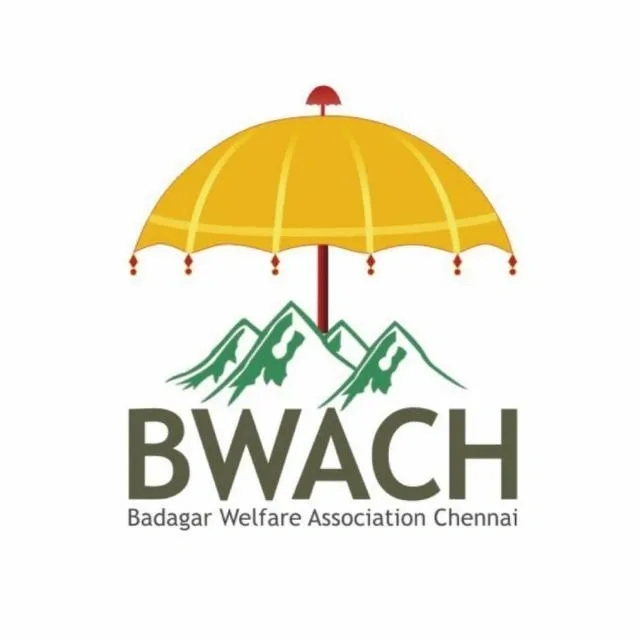BADAGAS AND BADAGA CULTURE
( Badaga community is a blessed community )
The Badagas are an ethno – linguistic community living in 341 Hatties / Oorus ( small villages / big villages) in Nilgiri district of Tamilnadu state.
There are around 4.5 lakhs badaga speakers in India / abroad and predominantly ( around 2 lakhs ) in Nilgiri a hilly district located in the western region of that shares its border with Coimbatore ( south), Erode ( East), Kerala ( North) and Karnataka (west).

Badaganadu or Nakkubetta ( Nilgiri) is segmented according to their living places into four seemais (Regionals) namely Poranganadu – 120 villages ( East ) , Mekkunadu – 87 villages ( West), Kundeanadu – 27 villages ( south-west) and Thodhanadu – 97 villages ( North ) . In addition to this there are 2 more seemsis called kil seemai consist of 5 oorus and Mel seemai consist of 5 oorus.
The badaga language is spoken by the badaga community.. Badaga language is a part of south India dravidian language family. It has its own unique grammar, vocabulary and pronunciation. The retroflex sounds of badaga language are unique.
Badaga language is a Badaga Social identity, Cultural identity and Spiritual identity..
Badagas are agriculturist and herders. Badagas are good in studies.
Badagas pay respect to their traditional community council system. Community judgements are always the honest and fair judgements. Badaga respect and accept the judgment of Gowda ( Head Man) in hatties, Parpathy ( seemai head man ) and) Nakkubetta Gowda (Head Man of the entire badaganadu or nakkubetta
Hatti level; Any issue ( personal or common issue) comes then people first report to Gowda (village head). Gowda call for a meeting, where all hatti people assemble at Dhevva Maney or Mandu ( meeting place). Gowda get advices from common people and give the fair judgement. All kinds of issues will be solved in the meeting place itself with honestly. That is the power the Dhevva Maney and power of the honest system. Almost all the village level issues will be solved in the village itself.
If issue is not solved in any particular case then it will go to the parpathy level meeting where many village head men and common people also participate and after all consultation, Parpathy ( Seemai head ) will give the fair judgement and solve the issue.
Even then problem not solved then issue will go to Nakkubetta Gowda. Nakkubetta judgment is the final judgement. People always accept the nakkubetta judgement.
Badagas have a unique culture which is entirely different from other community cultures. Badagas hospitality is the best among the all the communities in the world. Badagas join for all badaga functions, work unitedly, help each other’s and make every function as a successful one.
Badagas are soft in nature, polite and having good helping tendency. Badagas are sincere and hardworking people and badaga ladies are very hardworking and sincere in nature.
Badagas have certain customs and following in their cultural rituals ceremonies for entire life cycle. Viz., Naming for child, Puberty, Marriage, Seventh month Pregnancy and Death ceremony.
Badagas marry within their community and follow their own marriage tradition.
The badaga men costume consists of languti , white turban and Seelae. The badaga woman costume consists of white mundu, white Thundu , Satte or Rattus and pattu.
Badagas devotion to their own music and dance.
Badagas worship their seven founding ancestors under the name Hethai and celebrate the habba called hethai abba ( Hethai festival ).Other important badaga abbas are Dhevva habba ( Heriodaiya abba), Kariyabattarayar abba , Dhoddabba , shivarathiri abba, Sakalathi abba, Uppattabba , kanjikol abba, Karthikai deepam abba. Margazhi abba , Maalinga swami abba, Paruva gudi abba etc.
Badaga Blessing: Badaga blessing is another best custom of badagas.
It is a process of getting blessing from elders. Foot wear to be removed in blessing.
Bless receiving person ( he or she ), bowing the head and the blessing person ( he or she) , placing hands on receiving person , offer with blessing words Olenga eru (live good life ), Dhevaru harchavu, Selvakku and sokagava kokodili ( god give good health, wealth and happiness).
Badagas tribute to the United Nation for Accreditation (recognition) of badagas. The Badagas of the Nilgiri Mountain of South India as one of the world Indigenous tribes (people). Welcoming the inclusion of the badaga community in the UN Mountain Partnership
